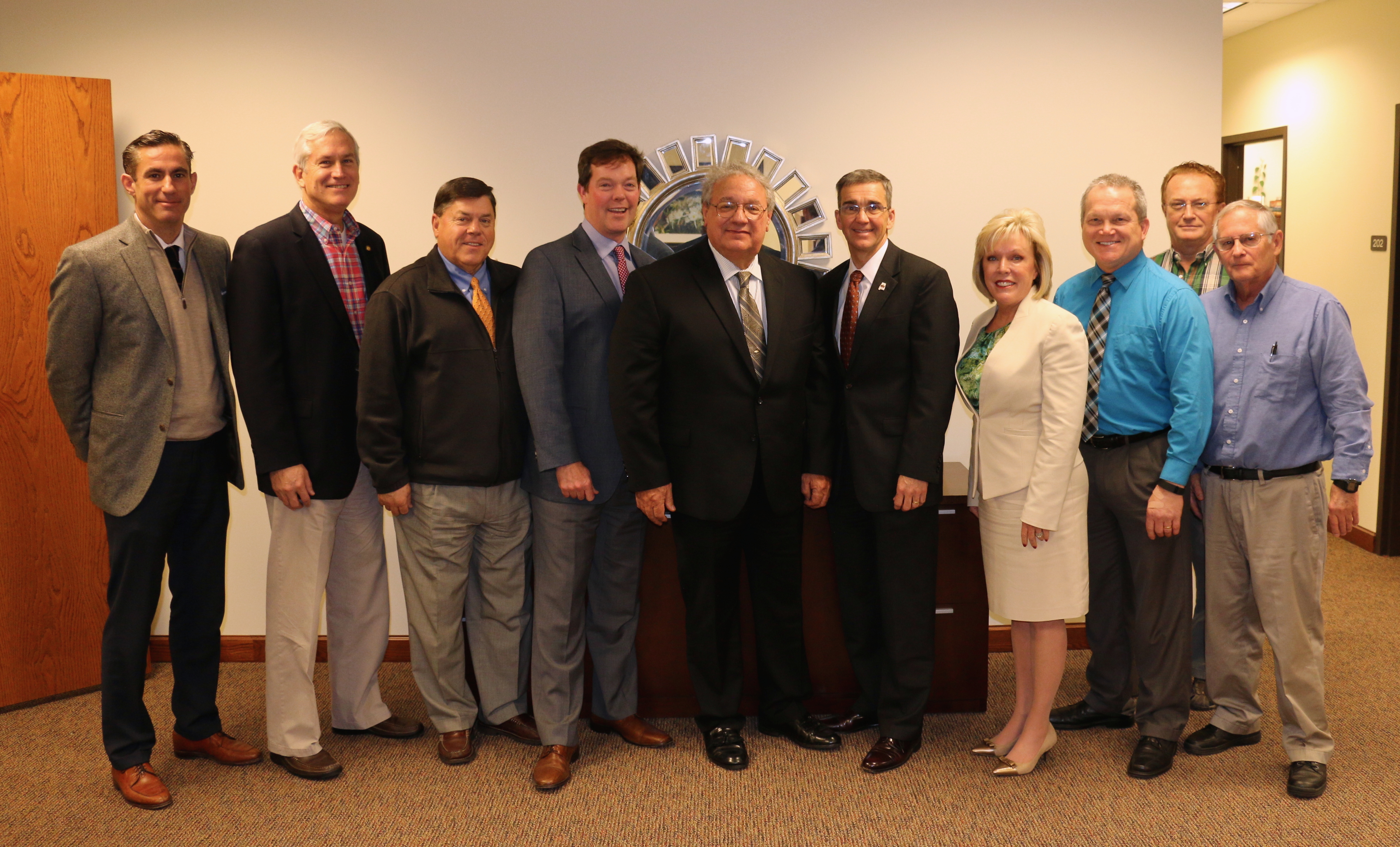Charles “CJ” Hincy, director, Auburn Governmental Affairs; Sen. Paul Bussman, R-Cullman; Earle Thompson, manager, Auburn UAS Program; James Birdsong, Auburn lecturer; Wayne Ceynowa, Auburn chief flight instructor; William “Bill” Hutto, director, Auburn Airport and Aviation Center; Dr. Vicki Karolewics, Wallace State president; Jimmy Hodges, Wallace State dean of applied technology; Bert Mackentepe, WSCC Aviation Department chair and airplane instructor; and Ted Stokes, Wallace State helicopter instructor
HANCEVILLE – Officials from Wallace State Community College and Auburn University met in Hanceville recently to discuss potential partnerships related to aviation.
“We are here today to look for ways to partner,” said Dr. Bill Hutto, director of the Auburn Airport and Aviation Center. “One of the missions of the Aviation Center is outreach, including providing pathways for community college students to earn baccalaureate degrees through our aviation program.”
Auburn offers degrees in aviation management and professional flight, providing natural pathways for students enrolled in Wallace State’s Aviation/Flight Technology program and associate in science general studies programs to continue their education seamlessly at Auburn.
“We look forward to expanding our partnership with Auburn University, an institution with a commitment to excellence that we share. This partnership will result in more opportunities for our students to earn scholarships and advanced education on the way to high-paying, high-demand careers in the field of aviation,” said Wallace State President Dr. Vicki Karolewics.
Students who start their aviation education and training at Wallace State can earn the first two years of the degree at a fraction of the cost. Once at Auburn, they are eligible for gateway internship programs with employers like Jet Blue, Express Jet, Endeavor and Envoy. Starting salaries at the conclusion of these programs can reach $58,000 per year.
“The industry is facing a huge pilot shortage, which is expected to continue for the next 15 years,” said James Birdsong, a lecturer with the program, a statement echoed by Wallace State instructor Bert Mackentepe. One of Mackentepe’s former students was just hired by American Airlines, he said, while many others have gone to work as corporate pilots or with law enforcement. The pilot shortage is due not only to increased training requirements since 2010, but also to the increase in global air travel and to an aging workforce, Birdsong said. Pilots are required to retire at age 65.
According to the Bureau of Labor Statistics, the median pay for commercial pilots in 2015 was $102,520.
Auburn also provides training and certification for operators of unmanned aircraft vehicle (UAV), commonly known as drones, training which Wallace State is looking into offering. In Alabama, drones are being used more and more in precision agriculture for surveying crops and bridges, construction, real estate, and law enforcement. This list is growing.
In addition to university transfer programs, Auburn expressed interest in partnering with Wallace State on rotorcraft or helicopter pilot training not currently offered through the university.
“We think a summer rotorcraft add-on for Wallace State to offer to Auburn students could be very beneficial,” said Earle Thompson, an Auburn instructor.
Wallace State offers both helicopter and fixed wing pilot training, with certifications and check offs ranging from ground school to private pilot, commercial pilot, certified flight instructor and air transport pilot, the latter of which is now required for all public airline pilot positions.
The Wallace State Flight program operates out of Cullman Regional Airport.
An Auburn-Wallace State aviation partnership builds on the Poultry Science 2 + 2 partnership already in place between the institutions and strengthens the seamless transfer of credit from public community colleges to universities guaranteed through the statewide articulation system known as STARS by providing support at the program level.
The institutions plan to do some joint marketing to let potential students know that pathways exist for students to start their aviation education at Wallace State and finish at Auburn.
For more information about the Wallace State Flight Training program, call 256-737-3040, email marsha.bradford@wallacestate.edu or visit www.wallacestate.edu. To learn more about Auburn’s program, call 334-844-1942, email AUAC@uburn.edu or visit www.auburn.edu/aviationcenter.



















